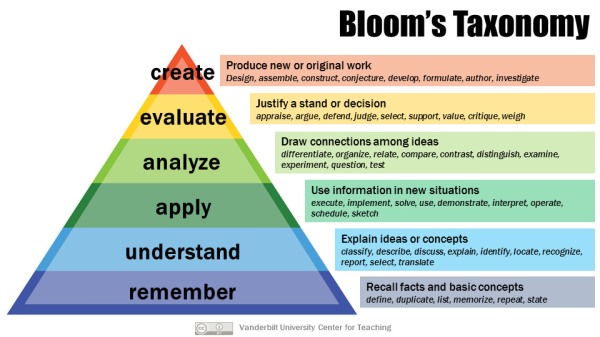Quizzes are great retrieval practice. If they’re super short and low-stakes (like a Kahoot!), they can also be a good way of making sure the whole class is on the same page to start the day. But every time I use quizzes to assess student learning, I feel like what I’m really assessing is how much students think like me. And a good quiz takes a long, long time to make. They’re really at their best at supporting students through the “remember” and “understand” parts of Bloom’s Taxonomy, but I’d rather be investing my precious prep-time in helping students move into application, analysis, evaluation, and creation.

So this Spring, in my Anthropology of Aging class, instead of giving my own quizzes, I had students make reading quizzes in small groups. The groups exchanged quizzes and took them. Then I graded them on the quizzes they made rather than the quizzes they took.
There were downsides – students were not always able to identify what was most important about the readings, and they were certainly no better at designing good questions than I am. There was a bit of a learning curve on how much time we spent discussing the quizzes. But there were enough upsides that I’ll definitely be using them again.
The best thing about the quizzes was that good questions really did reinforce key ideas for everyone, and weaker questions worked as really useful class discussion prompts. After they had taken the quizzes and self-graded, I asked students to identify which questions they wanted to have explained, which gave the creating group a chance to talk at more length about what they thought mattered and why, and gave me a chance to redirect anything heading off in the wrong direction. It did the awesome pedagogical thing of really being able to build off of where students are, rather than just gauging how far away they are from me. And it clearly did give students a sense of ownership of the material in a way that made me feel really good.
The icing on the cake is that those questions are a useful gauge to make sure that I’m appropriately scaffolding the concepts I teach.
Next time, here’s how I’ll lay it out:
- 6 question quizzes cover 2-3 readings each, and I tell them ahead of time which readings are best for which categories of question
- For example, “Keyword questions should come from Bledsoe 2002 or Johnson-Hanks 2006; Writing Techniques questions should come from Johnson-Hanks 2006 or Sokolovsky and Cohen 2009”
- Questions
- 5 categories of questions: 1 “main point” question, 2 “keyword” questions, 1 “course concept” question, 1 “writing techniques” question*, 1 “comparison between readings” question
- Questions should pull out the most useful points from each category
- Multiple Choice (3 answers) or True/False
- No trick questions
- 5 categories of questions: 1 “main point” question, 2 “keyword” questions, 1 “course concept” question, 1 “writing techniques” question*, 1 “comparison between readings” question
- Group work
- Each student contributes at least two questions to their group’s Google Doc, and they collaborate there (preferably using the chat feature) to choose and edit the best 6 questions (where I can see version and chat history to confirm everyone posted questions).
- Each group needs to submit their questions and answers before class so that I can add them to the day’s Powerpoint. Answer keys should include a very short summary of who wrote which question, and who did what administrative (printing, organizing, editing) work.
- Students are responsible for printing
This time, I included an individual annotation grade as part of the assignment (I walked around the room and checked off that they had annotated the readings covered in the quiz). But I felt like I left in a lot of room for BS, so I’ll probably do annotation checking differently next time.
I did four Group Led Reading Quizzes over 10 weeks this quarter, and I had them all exchange quizzes and take them at the same time. Next time, I think I’d rather have one group lead at a time, but have a quiz every week.
There were plenty of other take-aways at the end of this year (my first full academic year as a professor since completing my PhD!), but this one has the benefit of being easy to replicate, low-prep, and particularly good for new classes (or old classes with a lot of new readings). Hope someone else can get some use out of the idea, too!
* Because I ask students to write ethnographically at the end of the class, I ask them to pay attention to the writing techniques in everything they read and later experiment with applying some of them.